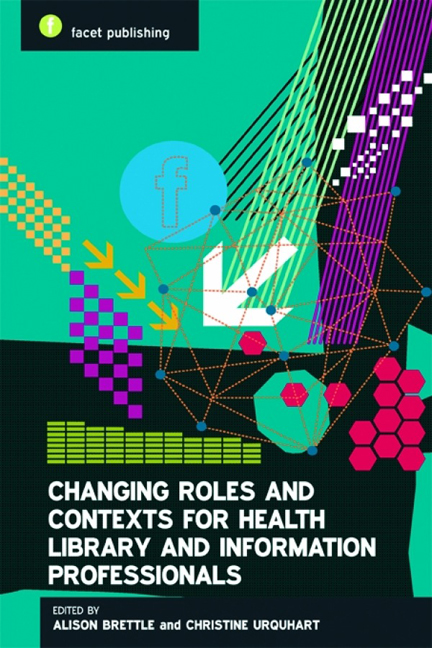Book contents
- Frontmatter
- Contents
- About the editors
- List of contributors
- Overview
- Part 1 Context
- 1 The changing context of health for library and information professionals
- 2 Changes in information generation and use
- 3 Changing technology to meet clinicians’ information needs
- 4 The influences of governance, consumers and evidence-based practice
- Part 2 Roles
- Conclusion
- Index
1 - The changing context of health for library and information professionals
from Part 1 - Context
Published online by Cambridge University Press: 08 June 2018
- Frontmatter
- Contents
- About the editors
- List of contributors
- Overview
- Part 1 Context
- 1 The changing context of health for library and information professionals
- 2 Changes in information generation and use
- 3 Changing technology to meet clinicians’ information needs
- 4 The influences of governance, consumers and evidence-based practice
- Part 2 Roles
- Conclusion
- Index
Summary
Introduction
This chapter looks forward and examines the changing context of health care and how this may affect health information professionals. It also reflects how health has changed over the last 15 years and the corresponding changes that health information professionals have made.
THE HEALTH CONTEXT
Christine Urquhart
Introduction – future changes in health care
Trying to predict the future is always difficult. For health care, we have some help from a report produced by the Foresight Panel established to predict health care trends for 2020, and provide recommendations for action by the UK government (Department of Trade and Industry, 2000). By the end of 2010, we should be able to judge how far we have progressed, and whether there have been other changes in science, technology or the socio-economic environment that now need to be considered. Most of the key recommendations would have some implications for the work of health information professionals but some have a direct impact, or might have had, if political and economic events had not overtaken the changes. The panel recommended that independent and publicly accountable bodies be formed to help regulate the privacy, availability, sourcing and accuracy of health information, as well as the access that should be granted to certain users of that information from patient records. These are not problems with easy solutions, as the Health 2.0 Debate (December 2010) in The Economist (online edition) indicates (The Economist Debates, 2010). Nevertheless, there is still strong support for the idea that patients should have more control over the health information that belongs to them. In the UK, the White Paper published in 2010 (Department of Health, 2010a) suggests that patients should have control of their health records, that patients should be able to determine who else can access their records, and should be able to see what changes have been made to their records. Sharing of records with organizations such as support groups should be possible if that enables patients to manage their condition better. Aggregated (and anonymized) patient data should be made available in a standard format to allow accredited intermediaries to analyse this for research, for presentation of data to patients and patient groups.
- Type
- Chapter
- Information
- Publisher: FacetPrint publication year: 2011



